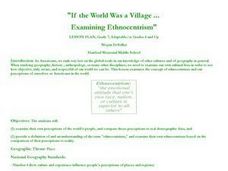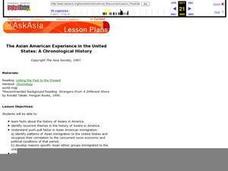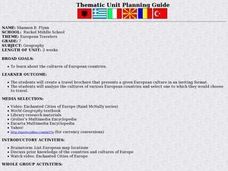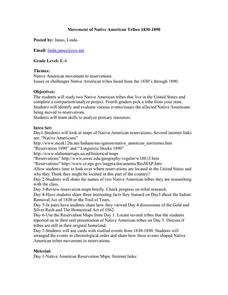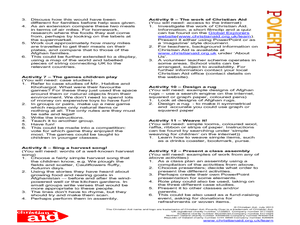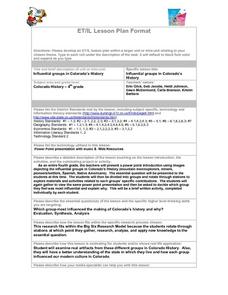Curated OER
Valley Forge
Students describe how location, weather, and physical environment affect the way people live, including the effects on their food, clothing, shelter, transportation, and recreation. They also describe the lives of American heroes who...
Curated OER
If the World Was a Village...Examining Ethnocentrism
Seventh graders examine their own perceptions of world's people, compare those perceptions to real demographic data, provide definition and understanding of term "ethnocentrism," and examine their own ethnocentrism based on comparison of...
Curated OER
President Jackson, the Cherokee and Indian Removal
Students interpret historical evidence presented in primary and secondary resources. In this Indian Removal Act lesson, students examine the act and discuss the implications of moving the Cherokee. Students...
Curated OER
The Asian American Experience in the United States: A Chronological History
Eleventh graders understand push-pull factor in Asian Amencan immigration. They identify patterns of Asian immigration to the United States and recognize their correlation to the concurrent socio-economic and political conditions of that...
Curated OER
European Travelers
Seventh graders explore the European travelers and culture. They create a travel brochure that presents a given European culture in an inviting format. Students analyze the cultures of various European countries and select one they would...
Curated OER
Movement of Native American Tribes 1830-1890
Students examine the movement of Native American tribes during the mid 1800's. For this American History lesson, students study two Native American tribes that live in the United States and complete a comparison/analyze project. Students...
Curated OER
The First Americans
Students participate in theatre activities to study American history. In this American history and theatre lesson, students work in groups to research a specific Native American group to investigate their lifestyle. Students then create...
Curated OER
Population and Population Density
Students read and interpret graphs. In this population activity, students explore population and population density as they read several data graphs and respond to questions.
Curated OER
The Geographic Doctor Seuss
Students define the term region using semantic mapping, listen to the Dr. Seuss story Yertle the Turtle, and discuss the conflict over borders in the story. They draw a map divided into regions.
Curated OER
Study of New York City
Fourth graders read A Cricket in Times Square and examine the essence of living in New York City. They examine subway maps and other resources concerning NYC and then complete several writing activities about the city. They also create...
Curated OER
The Life and Death of the Byzantine Empire
Ninth graders understand the state of the world around the year 1000 AD as it pertains to the Byzantine Empire. They analyze and discuss the characteristics of the Byzantine Empire.
Curated OER
Archaeological Study
Students analyze the difference between archaeology and anthropology while studying the evolution of different products. In this archaeology and anthropology instructional activity, students trace the progression of a certain tool or...
Curated OER
Harvest
Pupils research the harvest period in Afghanistan. In this harvest lesson plan, students learn about Afghanistan's weather, games children play, rug designing, harvest songs, and more about the harvest time.
Curated OER
Influential Groups In Colorado's History
Fourth graders watch a teacher made PowerPoint presentation that introduces the study of Colorado's history. They view images and listen to music that is indicative of the mountain men, miners, pioneers, the Spanish, and Native Americans...
Curated OER
There's a Place That Has a Race
Students define the term "place," collect data about Alaska and the Iditarod from several web sites, take online quiz using information gathered, and draw conclusions based upon their data collection and analysis.
Curated OER
Lesson 2: The Story of Flagstaff
Students, in groups, write and perform a skit that retells the story of the flooding of Flagstaff.
Curated OER
Trivia Books: Louisiana Purchase Bicentennial Celebration
Students detrmine the importance of point of view. They use a well-known fairy tale to explore how changing the point of view changes the whole story. They generate questions from the text they want answered during the unit and construct...
Curated OER
Social Studies: Kyrgyzstan Bride Kidnappings
Learners examine the Kyrgyzstan bride kidnappings and compare wedding traditions there with those in the United States. They explain these differences and similarities in a fictitious letter to a peer in Kyrgyzstan.
Curated OER
Oceanography
Fourth graders define new vocabulary associated with oceanography. They locate and label the four oceans. They also identify features of the ocean floor.
Curated OER
Mapping the National Parks
Students research national parks. In this science lesson, students view a video about the national parks and discuss the environments found within the national parks.
Curated OER
A Local History of Global Travel
Students research their families travel patterns over the last 100 years. They work with students in other countries to publish their findings. They also examine key events over the same 100 years.
Curated OER
Weather and Climate
Students identify the words plain and climate and discuss what would happen if it never rained. Students identify and interpret the weather in Poland and create a web illustrating various weather patterns. Students write a 4-line poem...
Curated OER
Southeast Asia And Globalization
Pupils investigate the area of Southeast Asia and how its economy has become the power that it is today. The concepts related to being a consumer are discussed. They go over how globalization has been introduced into Asia and helped to...
Curated OER
Feudal Japan and the Samurai
Students study the similarities of Feudal Japan and Europe. They show the feudal society of Japan, recognize the role of the samurai and identify the code of bushido.

